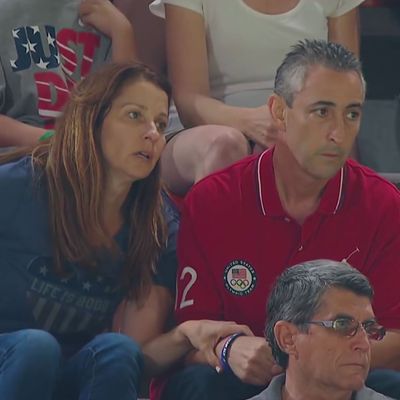
So far, the most unexpected breakout stars of this year’s Olympics might just be U.S. gymnast Aly Raisman’s parents, who’d have a clear shot at gold if only nervous reactions were actually a sport. Watch for yourself if you haven’t already: They may not have their daughter’s gravity-defying skills, but the Raismans can grip each other’s arms, lean anxiously, and mutter under their breath like they’ve been training for it all their lives.
Which is clearly an exaggeration, but not by as much as you might think: At the elite level, as athletes are training to become Olympians, athletes’ parents are often training to become the parents of Olympians. Sports psychologists don’t just help the competitors themselves; in some cases, they extend their services to their clients’ families, working with them to create the dynamic that’s most conducive to athletic achievement.
One of the biggest challenges for parents can be figuring out the optimal level of involvement, says Erica Force, the associate director of the Center for Sports Psychology at the University of North Texas. “It’s a bumpy road to the Olympics,” she says, and “ family support can play a big role in getting [an athlete] through those challenges.” Often, that means financial and logistical support; more importantly, it also means emotional support, helping the athlete though psychologically demanding training and competitions.
Sometimes, though, that emotional support can reach unhealthy levels, becoming an added source of stress. “Sometimes they’re a little bit too emotionally invested and they don’t know when to back off,” Force says. In those cases, having family members in the stands may hinder an Olympian more than it helps: “It can be nice for athletes to know that their parents are there at this big event, but at the same time, they can be a distraction.”
“You’re not the coach,” says Daniel Gould, a professor of applied sport psychology at Michigan State University, who went to the 1998 Winter Olympics in Nagano, Japan, with the U.S. men’s ski team. “ You’re there to be optimistic, supportive. Not to get into what the standings are.” If an athlete feels too much family pressure to medal, he says, the sport psychologist may arrange for a family session to quash what he calls “five-ring fever.”
Even when the parent-child relationship itself is a healthy one, Gould adds, psychologists may advise Olympians to set boundaries with their families leading up to their events. At the Olympics especially, athletes may see a bigger family-and-friends turnout than they’re used to, which could throw their pre-competition routine out of whack. “Most of these elite athletes know what they need to perform well, what kind of routine — do they want their family around, do they not want their family around,” he says.
“A good way to think about it is, the athlete’s on a business trip,” he adds. “You’re not in Disney World with your family.”




